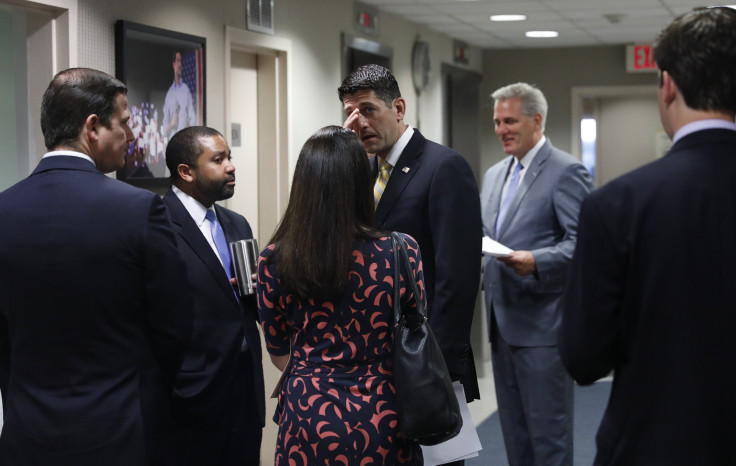Press Freedom Threatened Under Trump Administration, This Time In Capitol Hall

Sen. Richard Shelby (R-Alabama) issued a statement Tuesday asserting the Senate Rules Committee has not restricted journalists from conducting interviews on the Senate side of the Capitol complex. The clarification came after journalists expressed outrage for not being allowed to film interviews in the Capitol hall due to newly imposed restrictions on TV reporters.
CNN journalist Deirdre Walsh questioned the crackdown and urged other journalists to stand against the ban.
+ 1 access is access and we should all push back https://t.co/1PeFdFlQH1
— Deirdre Walsh (@deirdrekwalsh) June 13, 2017
Sen Rules Comm Chair Shelby, asked about move to restrict Cap Hill press access, says it was "a miscommunication" & "wasn't anything I did"
— Deirdre Walsh (@deirdrekwalsh) June 13, 2017
Several other reporters took a jibe at the government for restricting the access to Capitol hall.
Senate Democrats oppose efforts to limit hall interviews in Capitol, one of few remaining ways press can access lawmakers without PR filter https://t.co/E2zfNbBWpc
— Tom Risen (@TomRisen) June 13, 2017
Reporters told no more filmed interviews in U.S. Capitol hall. If you are systematically ruining the nation you need a little damned privacy
— johnbrummett (@johnbrummett) June 13, 2017
Faced with fierce backlash, Shelby backed away from the proposal after an emergency meeting between the Senate Rules Committee and media gallery directors, the Hill reported.
“The Committee has been working with the various galleries to ensure compliance with existing rules in an effort to help provide a safe environment for Members of Congress, the press corps, staff, and constituents as they travel from Senate offices to the Capitol. Once again, no additional restrictions have been put in place by the Rules Committee,” the statement issued by Shelby read.
This is not the first time when freedom of speech and the work of journalists has come under a cloud during the administration of President Donald Trump.
Proposal to change libel laws: Trump, who has unabashedly declared mainstream media as the enemy of the people, has often reiterated a campaign promise to change U.S. libel laws, apparently to make it easier to sue news organizations. Trump’s spokesman Sean Spicer, in a media briefing in May, said the White House was looking into ways to change the nation’s libel laws, a process that requires a constitutional amendment. During his election campaign last year, Trump had threatened several news outlets with lawsuits.
On his prolific Twitter account, he also demanded an apology Tuesday from "fake news" media for "all of the incorrect stories" about him.
EPA gag order: In January, the Environmental Protection Agency and the Department of Agriculture received instructions from the Trump administration to not share updates on social media or with reporters. The move was aimed at curbing the flow of information from several government agencies involved in environmental issues, Reuters reported.
Blocking reporters from briefings: In May, Secretary of State Rex Tillerson reportedly held a press conference in Riyadh in the absence of U.S. reporters, who, according to CNN, were left scrambling. The State Department, however, later offered a clarification, saying it couldn’t notify the press in time.
NEW: U.S. reporters apparently were not invited to Rex Tillerson's press conference today in Riyadh #TrumpinSaudi pic.twitter.com/nZbh1teM1l
— Formerly 'AM JOY' on @MSNBC (@amjoyshow) May 21, 2017
In a similar episode, Tillerson avoided reporters during his first major trip to Asia as secretary of state in March. “I’m not a big media press access person. I personally don’t need it,” he said at the time. Another incident that left journalists fuming was when Trump administration barred major news outlets — BBC, CNN and the Guardian — from an off-camera briefing by Spicer in the White House in February, the Guardian reported.
The president also angered reporters in February, when the press corps were placed in a basement suite of Trump National Club and Spa where the windows were covered with black plastic, blocking all view of the outside.
According to the media reports, the journalists were denied access to POTUS as he enjoyed a game of golf with Japanese Prime Minister Shinzo Abe. Among other journalists, White House reporter for Bloomberg, Jennifer Jacobs, took to Twitter to vent her ire.
Trump's press corps has been placed in a basement suite at Jupiter golf club. Black plastic over windows to give Trump privacy as he golfs. pic.twitter.com/8zbqi5HGSD
— Jennifer Jacobs (@JenniferJJacobs) February 11, 2017
© Copyright IBTimes 2024. All rights reserved.





















